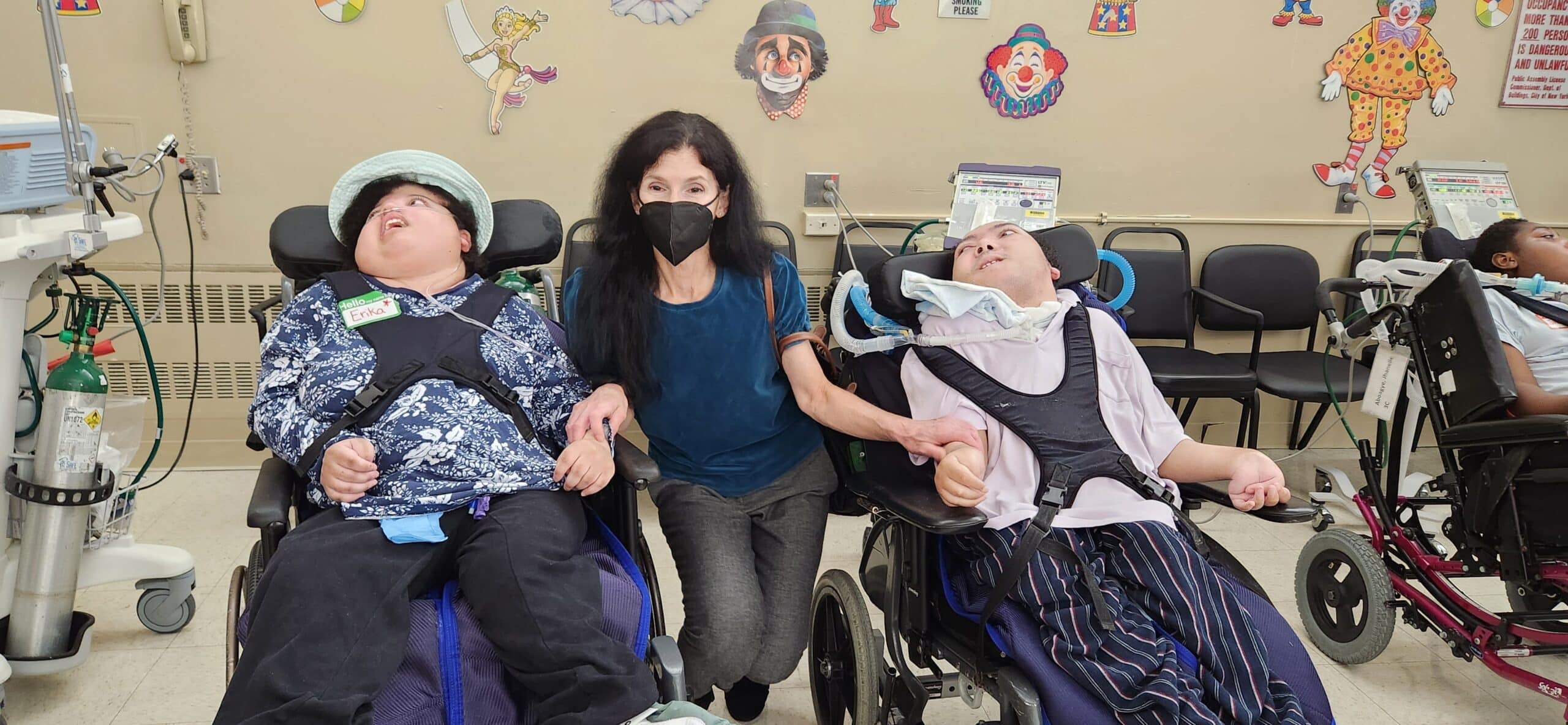
A caregiver’s guide to what life looks like in a medical specialty hospital for medically complex patients on ventilators.
Kara paints watercolors on Tuesday afternoons. She video calls her sister every morning at 9 AM. She cheers for the Yankees during playoff season.
Kara also lives on a ventilator in a specialty hospital.
Most families are not aware of what life can look like on a ventilator in a specialty medical hospital. It’s the reality for thousands of medically complex patients who’ve found a home in facilities designed for long-term care.
Understanding Life on a Ventilator
Medically complex children, young adults, and adults on long-term mechanical ventilation face a unique way of living:
- They require ongoing, high-acuity support that can’t always be provided at home
- They also need structured ways to create meaningful daily life
Specialty hospitals exist to support both medical goals and overall wellness needs.
This guide will walk you through:
- What daily life really looks like for ventilator-dependent patients
- How respiratory therapy, movement, and communication support happen daily
- What to look for in a high-quality facility
- How these hospitals become true homes
The Mission of Specialty Hospitals
Traditional hospitals focus on acute care and discharge. Specialty hospitals focus on life.
Specialty medical home facilities like ArchCare’s Mother Cabrini Hospital serve children and adults with complex needs such as:
- Congenital muscular dystrophy
- Severe brain injury
- Neurologic conditions that call for tracheostomy or full-time ventilator care
- Progressive disorders like ALS
One of the primary differences in a specialty medical home is that everything is designed for long-term care.
- Rooms have personal touches
- Schedules are based on patient preferences and needs
- Families become part of the care team and often feel like the hospital is a second home
A Typical Day in a Specialty Medical Hospital
Every day begins with basics: ventilator checks, medication administration, and vital signs.
Here’s what a normal day might look like:
| Time | Activity | Why It Matters |
| 8:00 AM | Morning care & positioning | Prevents pressure sores, starts the day comfortably |
| 9:00 AM | Physical therapy session | Maintains joint mobility, respiratory function |
| 10:30 AM | Activity: Educational or recreational | Cognitive stimulation, social connection |
| 12:00 PM | Nutrition support & lunch | Proper nutrition supports healing and energy |
| 2:00 PM | Occupational therapy | Maintains independence in daily tasks |
| 3:30 PM | Speech-language pathology | Communication support, swallowing safety |
| 5:00 PM | Family time or recreation | Strengthens relationships and emotional well-being |
| 7:00 PM | Evening care routine | Comfort and preparation for a restful night |
One special thing you may notice:
ArchCare teams prioritize both physical therapy and emotional well-being activities.
The Therapy Team: Movement, Voice, and Independence
Long-term ventilator patients need therapy to maintain strength, safety, and emotional health.
- Physical Therapy (PT)
Focuses on joint mobility through range-of-motion exercises and supports respiratory alignment and posture. Ongoing physical therapy prevents muscle weakness and injury over time. Our therapists adapt techniques specifically for ventilator-dependent patients to make sure they get the best care possible.
- Occupational Therapy (OT)
Builds independence in grooming, feeding, and daily living tasks. Our OT specialists use adaptive tools and techniques to assist patients with limited mobility.
- Speech-Language Pathology (SLP)
Supports language, communication, and safe swallowing. SLPs can help patients identify new methods for communication, included assisted devices when needed.
How to Evaluate a Specialty Medical Hospital for Long Term Ventilator Care
Our care team recommends you look for medical excellence in four key areas:
Medical Excellence:
- Board-certified pulmonologists on staff
- 24/7 respiratory therapy coverage
- Specialized ventilator management programs
- Regular equipment maintenance and backup systems
Life-Centered Care:
- Individualized care plans based on patient preferences
- Flexible family visiting policies
- Activities and recreation programs tailored to ability level
Family Support:
- Social work services for emotional and practical needs
- Clear communication about care plans and changes
- Family involvement in decision-making processes
Quality Indicators:
- Low infection rates and strong safety protocols
- Accreditation by healthcare organizations
- Staff-to-patient ratios that support personalized attention
- Positive feedback from current families
Why It Matters
Our approach recognizes that quality of life matters as much as length of life.
Every patient deserves dignity, respect, and human connection.
We’ve also learned that families need support too. Daily activities and even small moments can become lasting memories.
Kara’s Story: Finding Hope and Community
Remember Kara from the beginning? She’s been in her specialty hospital for three years now.
- She’s learned to write emails using assisted communication devices
- She completed online courses to stay socially connected
- Most importantly, she found community, purpose, and hope
Most importantly, she’s found community. Purpose. Hope.
Need Specialized Ventilator Care?
If your loved one is in need of long-term ventilator care, we’re here to help
Mother Cabrini Hospital for Children and Young Adults with Special Needs is a specialty medical hospital designed to support medically complex individuals with 24/7 respiratory therapy, individualized care plans, and a dedicated therapy team on both medical and emotional well-being.
To learn more about our specialized care services, please fill out the contact form on our website.
A member of our team will reach out to you to guide you through the next steps and answer any questions you may have.
Let us help you find the right care in a place that feels like home.